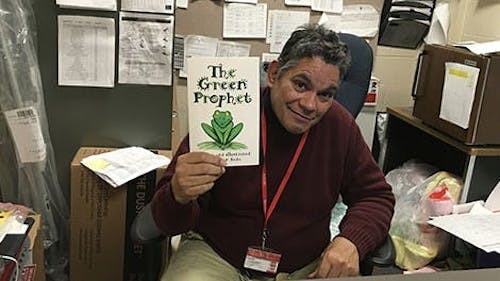Rutgers custodian intersects art, revelatory sermons and missionary work in his push away from drugs

As a missionary, artist, writer and foreperson for custodial services at University Facilities and Capital Planning, Nelson Seda is a man with a mission.
"The Green Prophet" is 1 of the 8 books Seda has published, stemming from biblical passages and his own take on morals and ethics.
His book has been distributed to missionaries all over the world including in the Philippines, South America and Portugal, he said.
Seda said he received the idea to write a book by partaking in puppetry and clowning during an outreach event he was in.
He said he started off with a puppet and then the idea got bigger.
"From there kids liked it and I thought I could expand it and write it as a book,” Seda said.
He said he did not expect any monetary gain from publishing his book.
“I didn’t charge, I just gave them out," Seda said. "I don’t expect to be rich I just want people to enjoy life and enjoy what God has to offer. After that, that’s their choice-- we all have choices you know.”
Among his goals include rewriting the rest of his books and doing the illustrations for them, he said. He also wants to open up a small business in graphic design, for t-shirts with his own art on it.
Seda said he has also done missionary work in the Canary Islands. As an aspiring artist, he painted two murals there and hopes to do more missionary work.
What drew him to missionary work was the need for change in his life, he said.
“I was a person that had drug problems, I drank a lot," Seda said. "I got involved with the wrong people, bad people. I ended up needing a change and my sister took me to church and (I) ended up getting saved that way."
He said that he worked in a factory plant at the time, where he did quality control work and spent a lot of time communicating with every employee.
The employees knew him as a person who was always drinking, partying and clubbing, he said. Then — all of a sudden — they saw a change. He said he believed that missionary work was his next step after his experience at the Canary Islands.
Seda said he has worked at Rutgers for more than 15 years, and finds time to write his books during the weekends and when he is off from work.
He said he does not do puppetry or clowning anymore, but he has taught his three children and wife to do so — who are still continuing the outreach.
Family plays a large role in Seda’s personal life. He said he wants his kids to understand that there is nothing like family, and he tries to instill this belief in and around the facilities he works at.
He said that as a pastor he normally does not get to see the lives of the people he changed, and does not expect to.
In one instance, a man did approach him to talk about the affect of his preaching, he said.
“'I remember you, you were the guy who was crazy on the stage preaching the gospel, I remember you,'" Seda said that the man said to him. "'You said to make a change and I changed my life. I was homeless, I didn’t have a job, I didn’t have anything going for me. I was on heroin. I’m married now, I have a good job, I have two kids, and every time I think about her as I walk in the front door of my house it’s what you said that comes to mind.'"
Seda said that people make their decisions and put themselves in different situations, but that they also have the ability to make decisions and get themselves out.
As for Rutgers students, Seda said they should look to find something that makes them happy, not necessarily what will make them the most money. His proudest accomplishment is his children.
“I see that their minds are developing confused," Seda said. "I always see students in one area of what they want to do, which is which occupation will I profit from the most. My opinion, if you’re going to make more money and you’re not happy, you’re going to be miserable. You look for something that you feel that you’re going to be happy in.”



